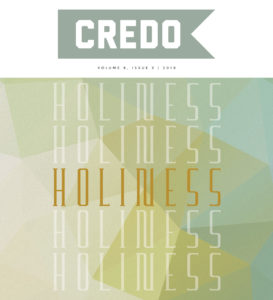Is repentance only a personal endeavor? What influence does covenant have on our understanding of holiness? In this interview, we talk with Mark Boda the nature of repentance, and how it is set forward in both testaments. Mark Boda is Professor of Old Testament at McMaster Divinity College. He has authored 12 books, edited 19 volumes of collected essays, and written over 100 articles on various topics related to the Old Testament and Christian Theology. Two of his books include The Heartbeat of Old Testament Theology: Three Credal Expressions and a commentary on Zechariah in the NICOT series.
In Return to Me: A Biblical Theology of Repentance, you refer to three dimensions of repentance in Old Testament Theology: relational affiliation to God, external change in behavior, and internal change in affection. Why is the relational affiliation to God the fundamental motivation?
The dominance of the relational affiliation is connected to the covenantal character of Old Testament revelation and faith. Yahweh declares himself as covenantal through what I call the relational creed: I am your God and you are My people (see my book Heartbeat of Old Testament Theology, Baker Academic, 2017). This relational affiliation, however, is inextricably intertwined with the other dimensions: the behavioral, internal, and verbal-ritual. These other dimensions evidence the relational. The importance of the relational is emphasized by the title of my book which was drawn from Zechariah 1:3 where we hear Yahweh first calling the restoration community to “Return to Me…that I may return to you” before we hear him calling: “Return from your evil ways and from your evil deeds” in 1:4. It is the invitation to covenantal intimacy that provides the foundation for the call away from inappropriate behavior. When this relational affiliation is experienced by the people of God, the behavioral shifts are no longer the challenge.
You argue that God’s wrath and discipline as motivations to repentance should not be downplayed in Old or New Testament Theology. Why is it that God’s wrath and discipline are key prompts for repentance?
There is a long tradition of Christian interpreters juxtaposing the Old and New Testaments on this issue of wrath versus grace. In my review of Old and New Testament theologies, I argued that both wrath and grace are found in both testaments in connection with repentance. This is because wrath and grace are clearly articulated as part of the character of the God revealed in Scripture, reflected then in his acts of justice and mercy in both testaments. Interestingly the passage most often cited as evidence of the New Testament focus on grace over wrath as motivation for repentance, Romans 2:4 (“the kindness of God leads you to repentance”), is set within a context that emphasizes the wrath of God in the coming day of wrath and revelation (2:5). The revelation of Yahweh in Exodus 34:6–7 is one that places grace and wrath alongside one another as expressions of the faithful character of the Triune God and we find allusions to this revelation of God’s character throughout the Old and New Testaments (see again my book Heartbeat of Old Testament Theology).
How is it that repentance is the key mark of restoration and covenant renewal?
Since repentance is fundamentally relational, a turning to a person in relationship, it is thus essential to covenant renewal, as the people of God turn away from those objects (whether gods or selfish acts) that captured their affections and turn to their God. The climactic depiction of covenant renewal in Old Testament redemptive history is the restoration of the people to and in the land after the fall of Jerusalem. It is this covenant renewal that sets the stage for the New Testament drama, a covenant renewal heralded by John the Baptist, accomplished through the acts of Jesus Christ, and essential to the birth of the Church at Pentecost. The climactic depiction of covenant renewal in Old Testament redemptive history is the restoration of the people to and in the land after the fall of Jerusalem. Click To Tweet
Was Martin Luther right when he said that “the entire life of the believer must be one of repentance”?
We often think of repentance as somehow connected to “works” and I have tried to show that while change in behavior is a key dimension of repentance in the Bible repentance is foundationally an inner shift of the affections in relationship that is displayed in both word and deed. In this way, it is closely related to “faith,” highlighting the passive (trust) and active (faithfulness) character of faith that is found throughout the biblical witness. This is not to be confined to the initial stage of the life of faith, a fact that I develop in the final section of my book, showing how penitential passages in the New Testament focus on both the stage of conversion as well as the subsequent stages of sanctification. Luther, drawing on the Lord’s prayer, highlights the importance of the penitential cry for forgiveness throughout one’s Christian life (this is found in Luther’s Explanations of the Ninety-five Theses, produced by him in the period following 1517; see Luther’s Works: Career of the Reformer: 1, Volume 31, Edited by Harold J. Grimm. Philadelphia: Fortress Press, 1957).
How does the fulfillment of the new covenant by Christ affect one’s understanding of repentance and holiness?
Since repentance is not diminished in the presentation of the gospel in the New Testament, appearing on the lips of John the Baptist, Jesus, and the apostolic witness in the Book of Acts, we know that repentance endures as a key response exemplifying the people of God under the new covenant. An important aspect of the climactic era of the new covenant, however, is signaled by the sending of the Holy Spirit in Acts 2. It is this divine enablement through the indwelling Holy Spirit that grants Christians the opportunity to fulfill the prophetic calls to repentance seen throughout the Old Testament.
What role does our confidence in the covenant-keeping nature of God play in our relationship to Him? How does God’s passionate pursuit of his people help them to “abstain from every form of evil”?
The covenant-keeping nature of God is very important to the revelation of Yahweh throughout Scripture. His covenantal pursuit lies at the core of the various narrative creeds throughout Scripture (e.g., Neh 9) as well as the presentations of his character (e.g., Exod 34:6–10). It is then not surprising that such a God would provide the resources to make repentance possible. He would do this by the selfless acts of pouring out himself, first through the sacrifice of his Son, and secondly through the indwelling of the Holy Spirit. These acts are the ultimate expression of his passionate pursuit of his people.
What role does the Spirit have in this relational penitential process and how important is it that believers depend on his supernatural help?
As I show in Return to Me, revelation of divine enablement for repentance can be found in each of the major sections of the Old Testament but reaches a climax in the Prophets because this revelatory tradition is commissioned to call the people to covenant renewal by returning to God. Experiencing the stubbornness of the people to respond to their calls to repent, the prophets look to a future work of God within the heart of the believer which is consistently linked to an inner work of the Spirit of God. This hope becomes a reality according to the New Testament through the outpouring of the Holy Spirit at Pentecost. This is an essential component of redemptive history and marks the New Testament theology of sanctification. The work of God within the believer is not only an objective work of grace that secures a transfer from one kingdom to another, from one status to another, but is also a subjective work of grace that begins an internal transformation. This transformation, which is simply the penitential life of faith, begins through divine enablement and only is possible through a daily connection with the triune God as John 14–16 shows us.
J. Gresham Machen spoke often of Jesus as the object of our faith (and thereby repentance). Is this true in relation to repentance?
My study of repentance and faith in the New Testament has convinced me that repentance and faith are so closely related as to become indistinguishable, which explains why they are both so important to the preaching of John the Baptist, Jesus, and the apostles. Since repentance is foundationally a turning toward God, Jesus is truly the object of repentance, that is, he is the one to whom we must turn in trust and faithfulness. Jesus is also the object of repentance because he is the one whose life exemplified the perfect will of God both internally and externally. Since repentance is foundationally a turning towards God, Jesus is truly the object of repentance, that is, He is the One to whom we must turn in trust and faithfulness. Click To Tweet
In light of the life, death, resurrection, and ascension of Jesus serving as the basis for the removal of and victory over sin in our lives, how might we help one another install a ‘habit of repenting,’ as J.I. Packer once said?
We need to fully explore our ecclesiology, taking seriously our interconnectedness as a community of faith. If our faith is shaped by passages like James 5:19–20 and 1 John 5:16–17 we all must play an important role in each other’s lives. Western individualism has led us to isolate ourselves from one another, viewing ourselves apart from our identity as the community of Christ. So, I am convinced that this demands greater accountability to one another within the church, inviting one another into our inner and outer lives in order to find grace in our time of need. By this, I don’t mean a controlling legalism, but an honest engagement with one another that provides opportunities for grace in order to save us from the ravages of sin. We should reconsider the shape of our corporate worship experiences, providing opportunities for repentance on a regular basis, either for those who have never entered into a relationship with Jesus Christ or for those who have enjoyed that relationship but are on the journey of sanctification. Possibly the struggle the present generation has with sin is related to our avoidance of the penitential within our corporate gatherings.


